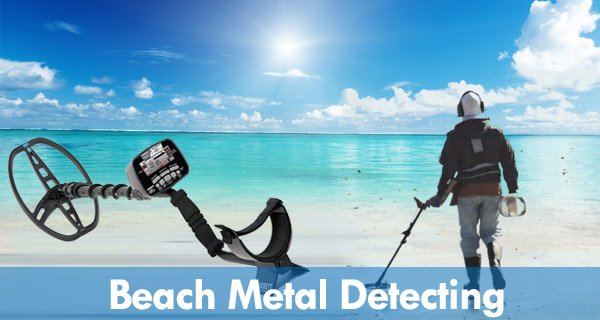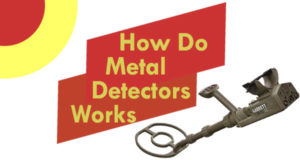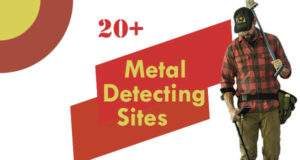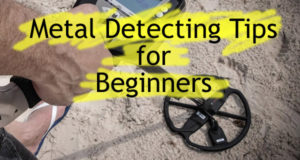Have you decided to take a trip to the shore?
Well, there’s nothing better to carry a metal detector to the shore. A salty water beach is an ideal place when it comes to precious metal detection.
I am here to offer some beach metal detecting tips and tricks that you may use to get some good relics.
This article will cover on Everything You Need To Know About Beach Metal Detecting.
With this in mind, we can now focus on things to consider, and some of the most exciting things you can get from the beach.
The most important thing is to understand how to deal with anything acquired during your hunt. In case you happen to be on a budget, the Very Low Frequency (VLF) metal detectors are the right choice for you. A metal detector with the VLF circuit also has a ground adjust control.
But in case you feel that you need absolute results from the beach. Then you need a Pulse Induction (PI) piece of technology. This one ignores the effects of minerals thus allowing you to pick the right treasure.
Let’s have a look at a list of the best metal detectors to use when you go to the beach:
Entry level beach hunting metal detectors
- Bounty hunter platinum
- Garrett ace 400
Shallow water beach hunting metal detectors
- Garrett AT Pro
- Director pro-pirate pro
- The whites MX sport
Premium beach hunting metal detectors
- XP DEUS
- Top beach hunting metal detectors
Top beach hunting metal detectors
- Garrett ATX
Diving metal detectors
- Whites PI dual field
- Tesoro sand shark
- Fisher CZ-2T
- Tesoro tiger shark
- Garrett sea hunter mark II
Let us have a look at some of the best places for metal detecting activities.
- Dips and gullies
These are the things you ought to look for when you go to the beach. Natural dips in the sand are always caused by wave action. Gullies are places where water deposits objects due to its slow movement. Thus the depressions trap many objects. If you happen to visit the beach and find a dip or gully, always check them first. - Rocky outcrop and pebbles
These are other very good areas on the beach where you should check or run over your metal detectors. This is because they trap coins, rings, and other precious materials. - Rock pools
Always pay attention when it comes to shallow rock pulls on a beach. They should be on your mind every time you think of going hunting to the beach with your metal detector. They can be but hazardous especially with a person wearing the wrong kind of boots on. - Storm damage
This should be one of a must visit areas when it comes to metal detection. It is a vigorous and exciting weather activity. The activity sweeps sand dunes away thus uncovering contents below them. - Beach exits and entrances
This is the final place we use our metal detectors. This is because most people tend to drop things when purchasing things like foods and drinks. - Activity centers
These are areas where people play volleyball, football, soccer, and horseshoes. People tend to drop their belongings when jumping up or down either when playing or cheering.
Beach digging tools after metal detecting:
- Fiskars Big Grip Garden Knife
- Lesche Sampson Pro-Series Shovel
- Garrett Metal Sand Scoop
- Lesche Mini Sampson Shovel
- Lesche Digging Tool and Sod Cutter
- Garrett Edge Digger
- White’s Dig Master
- Lesche Sampson Pro-Series shovel with T-handle
- Lesche Ground Shark Relic Hunter shovel
Tips for beginners when you go to the beach with a metal detector:
- Always expect to find more trash than treasure.
- Make sure that you buy the best metal detector.
- Dig everything.
- Avoidance of high traffic places.
- Start at your own backyard and see if you can get anything.
- Go hunting after rain.
- Carry a place to put your stuff.
- Going early in the day or very late.
- Keeping a record of your findings.
Metal detecting laws
Metal detecting laws are some of the most important things among Everything You Need To Know About Beach Metal Detecting.These laws include:
- The use private lands for metal detection should follow a certain procedure. First of all, make sure that you get permission from the owner or caretaker of the property. Then go ahead with the activity if you get the go ahead.
- For those in the US counties, here are some acts to get:
- The 1906 American Antiquities Act
- A 1966 National Historic Preservation Act As amended through 2000
- The 1997 Archaeological Resources Protection Act
- And finally the 1990 Native American Graves Protection and Repatriation Act
- For those in the UK, you can get a permit from the Crown Estate to metal detect on Crown Estate Foreshore.
- Any permit holder should read all the terms and conditions with utmost keenness. They should then carry themselves in accordance with these terms and conditions.
- Responsible use of the beaches during metal detection activities. Should be carried out without disturbance of archaeological sites.
But, in some beaches, you do not need to get a permit to carry out metal detecting.
Sometimes you might feel that metal detection is part of you or something you cannot do without. But make sure that you do proper research to prevent ending up behind bars.
And for those who still haven’t started on metal detection, I would encourage you to take it up as a hobby. Because you don’t know what you might find on the beach that may change your life completely.






Comments are closed.